Analysing Globalisation's Effect on International Team Dynamics
VerifiedAdded on 2023/04/21
|12
|3405
|208
Essay
AI Summary
This essay examines the profound impact of globalisation on the contemporary business world, focusing on its influence on international teams. It begins by defining globalisation, drawing upon various scholars' perspectives, and then critically assesses its effects on the operations of international teams within businesses. The paper highlights how globalisation has increased international business growth, creating opportunities and challenges for companies. It also emphasises the importance of cross-cultural management and leadership in maintaining effective teamwork in diverse global environments. The research further relates the positive earning changes, employee training processes, and the need for new policies to address cultural diversity within the workforce. The essay concludes by underscoring the necessity for businesses to adapt their strategies and leadership approaches to navigate the complexities of a globalised world, ensuring they can leverage the benefits of diverse teams while mitigating potential conflicts and misunderstandings. Desklib provides access to similar essays and solved assignments for students.
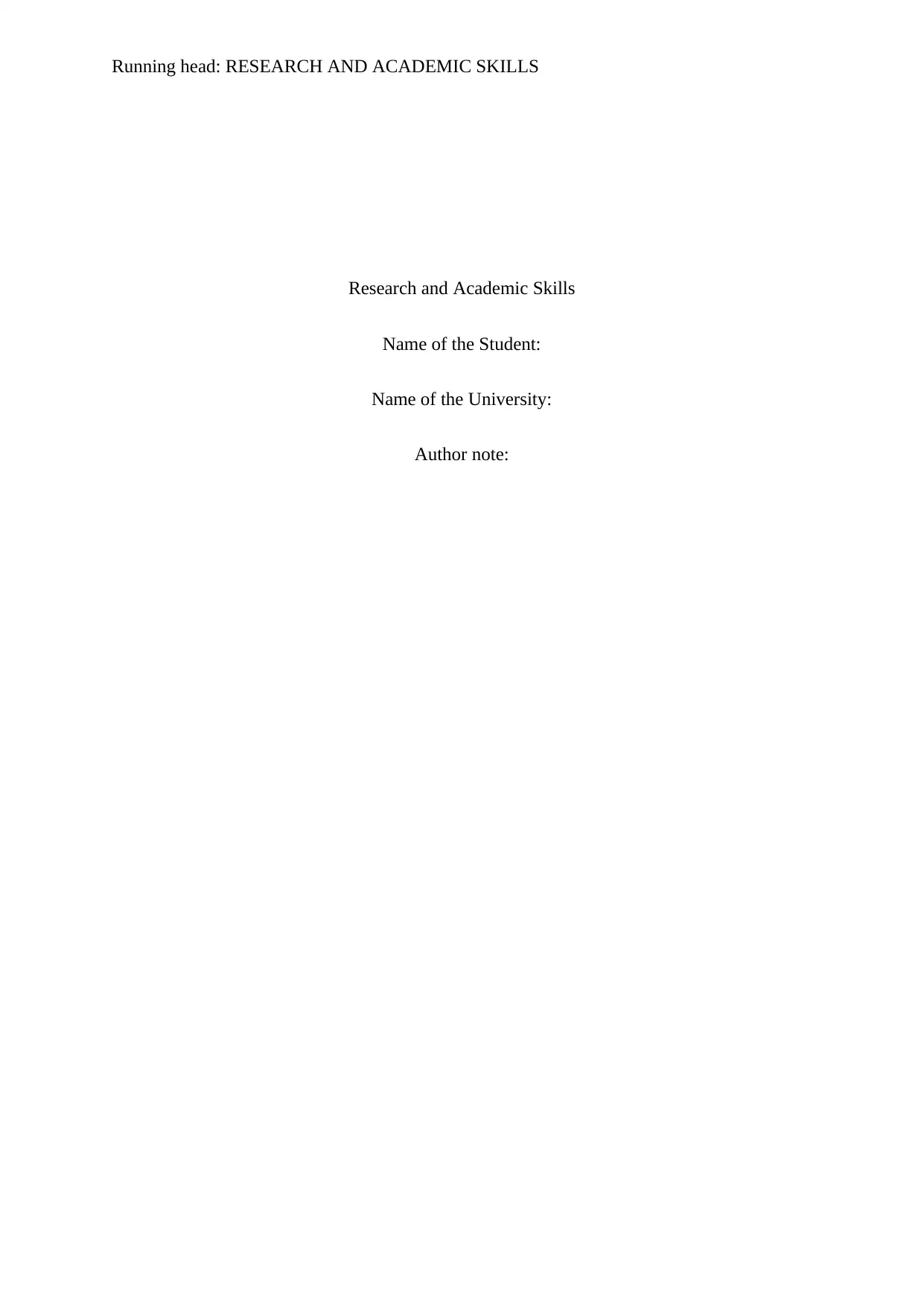
Running head: RESEARCH AND ACADEMIC SKILLS
Research and Academic Skills
Name of the Student:
Name of the University:
Author note:
Research and Academic Skills
Name of the Student:
Name of the University:
Author note:
Paraphrase This Document
Need a fresh take? Get an instant paraphrase of this document with our AI Paraphraser
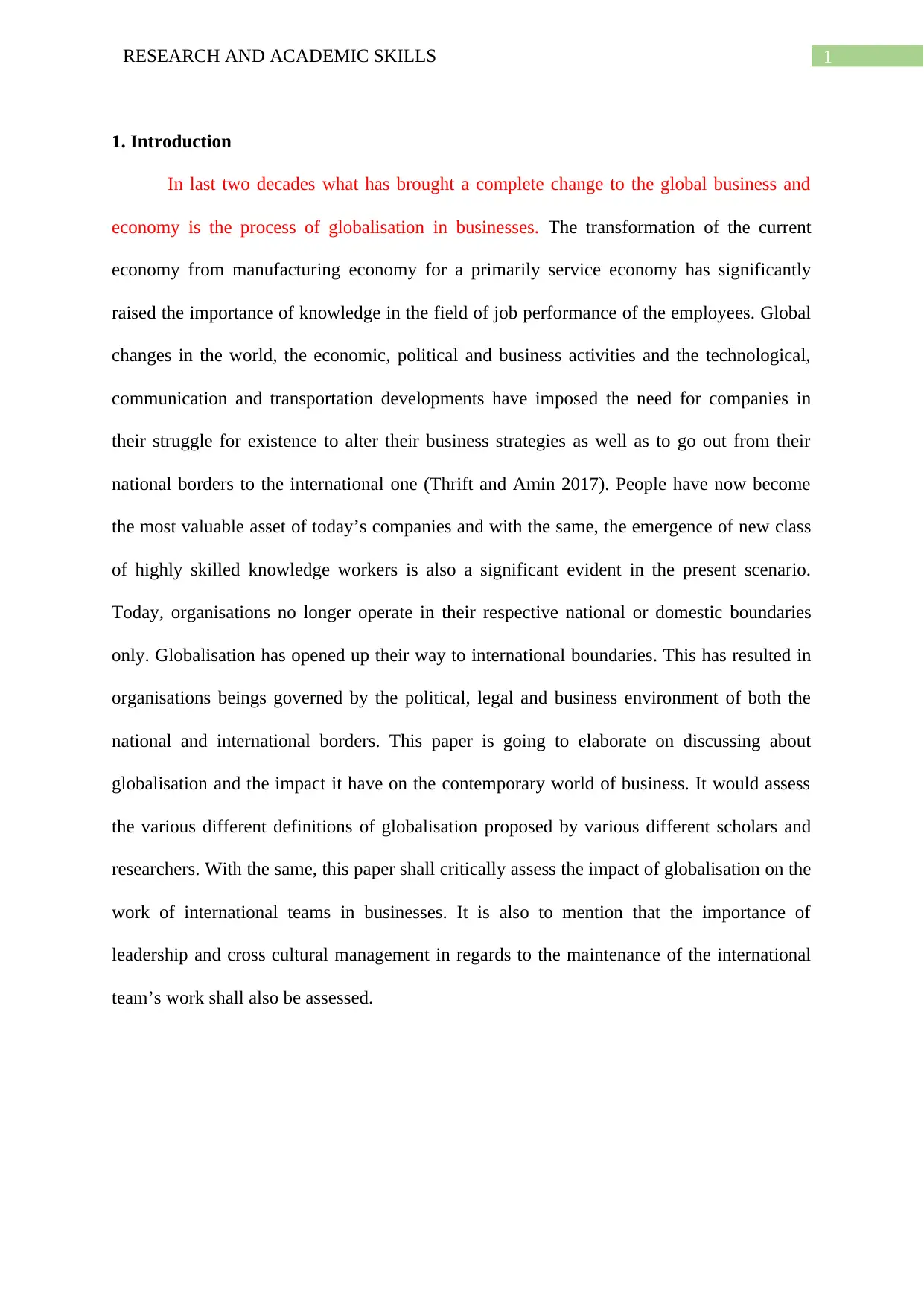
1RESEARCH AND ACADEMIC SKILLS
1. Introduction
In last two decades what has brought a complete change to the global business and
economy is the process of globalisation in businesses. The transformation of the current
economy from manufacturing economy for a primarily service economy has significantly
raised the importance of knowledge in the field of job performance of the employees. Global
changes in the world, the economic, political and business activities and the technological,
communication and transportation developments have imposed the need for companies in
their struggle for existence to alter their business strategies as well as to go out from their
national borders to the international one (Thrift and Amin 2017). People have now become
the most valuable asset of today’s companies and with the same, the emergence of new class
of highly skilled knowledge workers is also a significant evident in the present scenario.
Today, organisations no longer operate in their respective national or domestic boundaries
only. Globalisation has opened up their way to international boundaries. This has resulted in
organisations beings governed by the political, legal and business environment of both the
national and international borders. This paper is going to elaborate on discussing about
globalisation and the impact it have on the contemporary world of business. It would assess
the various different definitions of globalisation proposed by various different scholars and
researchers. With the same, this paper shall critically assess the impact of globalisation on the
work of international teams in businesses. It is also to mention that the importance of
leadership and cross cultural management in regards to the maintenance of the international
team’s work shall also be assessed.
1. Introduction
In last two decades what has brought a complete change to the global business and
economy is the process of globalisation in businesses. The transformation of the current
economy from manufacturing economy for a primarily service economy has significantly
raised the importance of knowledge in the field of job performance of the employees. Global
changes in the world, the economic, political and business activities and the technological,
communication and transportation developments have imposed the need for companies in
their struggle for existence to alter their business strategies as well as to go out from their
national borders to the international one (Thrift and Amin 2017). People have now become
the most valuable asset of today’s companies and with the same, the emergence of new class
of highly skilled knowledge workers is also a significant evident in the present scenario.
Today, organisations no longer operate in their respective national or domestic boundaries
only. Globalisation has opened up their way to international boundaries. This has resulted in
organisations beings governed by the political, legal and business environment of both the
national and international borders. This paper is going to elaborate on discussing about
globalisation and the impact it have on the contemporary world of business. It would assess
the various different definitions of globalisation proposed by various different scholars and
researchers. With the same, this paper shall critically assess the impact of globalisation on the
work of international teams in businesses. It is also to mention that the importance of
leadership and cross cultural management in regards to the maintenance of the international
team’s work shall also be assessed.
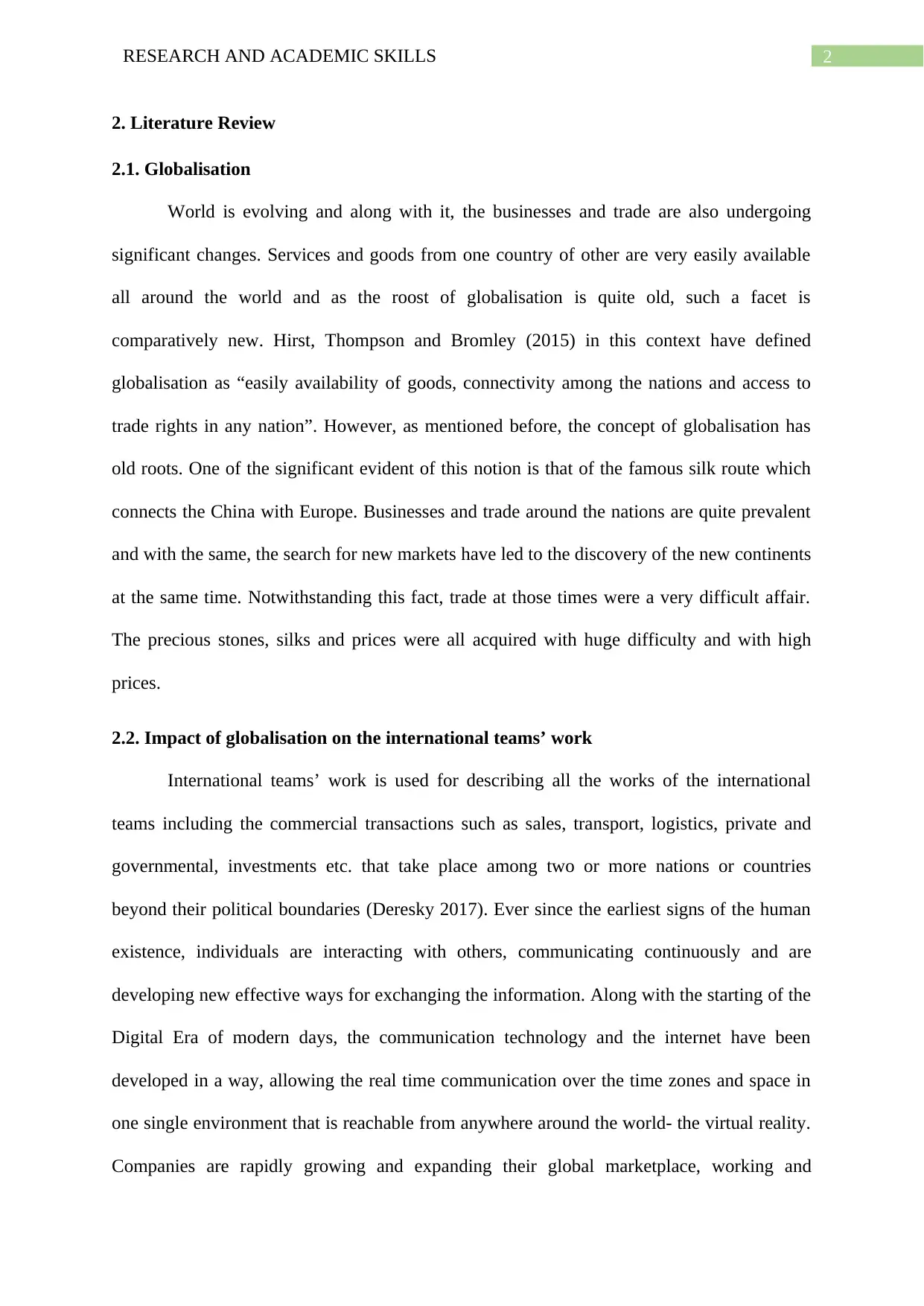
2RESEARCH AND ACADEMIC SKILLS
2. Literature Review
2.1. Globalisation
World is evolving and along with it, the businesses and trade are also undergoing
significant changes. Services and goods from one country of other are very easily available
all around the world and as the roost of globalisation is quite old, such a facet is
comparatively new. Hirst, Thompson and Bromley (2015) in this context have defined
globalisation as “easily availability of goods, connectivity among the nations and access to
trade rights in any nation”. However, as mentioned before, the concept of globalisation has
old roots. One of the significant evident of this notion is that of the famous silk route which
connects the China with Europe. Businesses and trade around the nations are quite prevalent
and with the same, the search for new markets have led to the discovery of the new continents
at the same time. Notwithstanding this fact, trade at those times were a very difficult affair.
The precious stones, silks and prices were all acquired with huge difficulty and with high
prices.
2.2. Impact of globalisation on the international teams’ work
International teams’ work is used for describing all the works of the international
teams including the commercial transactions such as sales, transport, logistics, private and
governmental, investments etc. that take place among two or more nations or countries
beyond their political boundaries (Deresky 2017). Ever since the earliest signs of the human
existence, individuals are interacting with others, communicating continuously and are
developing new effective ways for exchanging the information. Along with the starting of the
Digital Era of modern days, the communication technology and the internet have been
developed in a way, allowing the real time communication over the time zones and space in
one single environment that is reachable from anywhere around the world- the virtual reality.
Companies are rapidly growing and expanding their global marketplace, working and
2. Literature Review
2.1. Globalisation
World is evolving and along with it, the businesses and trade are also undergoing
significant changes. Services and goods from one country of other are very easily available
all around the world and as the roost of globalisation is quite old, such a facet is
comparatively new. Hirst, Thompson and Bromley (2015) in this context have defined
globalisation as “easily availability of goods, connectivity among the nations and access to
trade rights in any nation”. However, as mentioned before, the concept of globalisation has
old roots. One of the significant evident of this notion is that of the famous silk route which
connects the China with Europe. Businesses and trade around the nations are quite prevalent
and with the same, the search for new markets have led to the discovery of the new continents
at the same time. Notwithstanding this fact, trade at those times were a very difficult affair.
The precious stones, silks and prices were all acquired with huge difficulty and with high
prices.
2.2. Impact of globalisation on the international teams’ work
International teams’ work is used for describing all the works of the international
teams including the commercial transactions such as sales, transport, logistics, private and
governmental, investments etc. that take place among two or more nations or countries
beyond their political boundaries (Deresky 2017). Ever since the earliest signs of the human
existence, individuals are interacting with others, communicating continuously and are
developing new effective ways for exchanging the information. Along with the starting of the
Digital Era of modern days, the communication technology and the internet have been
developed in a way, allowing the real time communication over the time zones and space in
one single environment that is reachable from anywhere around the world- the virtual reality.
Companies are rapidly growing and expanding their global marketplace, working and
⊘ This is a preview!⊘
Do you want full access?
Subscribe today to unlock all pages.

Trusted by 1+ million students worldwide
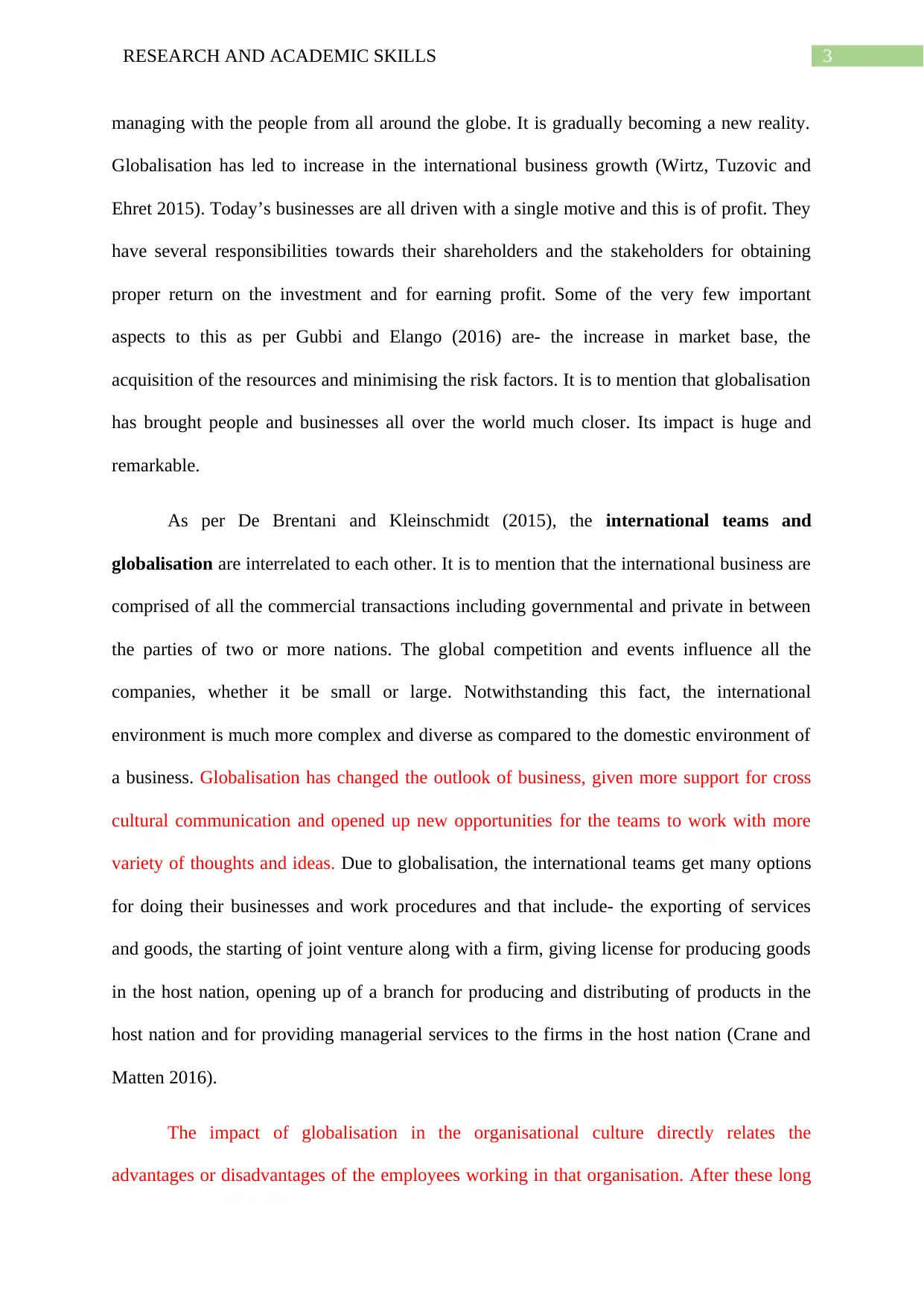
3RESEARCH AND ACADEMIC SKILLS
managing with the people from all around the globe. It is gradually becoming a new reality.
Globalisation has led to increase in the international business growth (Wirtz, Tuzovic and
Ehret 2015). Today’s businesses are all driven with a single motive and this is of profit. They
have several responsibilities towards their shareholders and the stakeholders for obtaining
proper return on the investment and for earning profit. Some of the very few important
aspects to this as per Gubbi and Elango (2016) are- the increase in market base, the
acquisition of the resources and minimising the risk factors. It is to mention that globalisation
has brought people and businesses all over the world much closer. Its impact is huge and
remarkable.
As per De Brentani and Kleinschmidt (2015), the international teams and
globalisation are interrelated to each other. It is to mention that the international business are
comprised of all the commercial transactions including governmental and private in between
the parties of two or more nations. The global competition and events influence all the
companies, whether it be small or large. Notwithstanding this fact, the international
environment is much more complex and diverse as compared to the domestic environment of
a business. Globalisation has changed the outlook of business, given more support for cross
cultural communication and opened up new opportunities for the teams to work with more
variety of thoughts and ideas. Due to globalisation, the international teams get many options
for doing their businesses and work procedures and that include- the exporting of services
and goods, the starting of joint venture along with a firm, giving license for producing goods
in the host nation, opening up of a branch for producing and distributing of products in the
host nation and for providing managerial services to the firms in the host nation (Crane and
Matten 2016).
The impact of globalisation in the organisational culture directly relates the
advantages or disadvantages of the employees working in that organisation. After these long
managing with the people from all around the globe. It is gradually becoming a new reality.
Globalisation has led to increase in the international business growth (Wirtz, Tuzovic and
Ehret 2015). Today’s businesses are all driven with a single motive and this is of profit. They
have several responsibilities towards their shareholders and the stakeholders for obtaining
proper return on the investment and for earning profit. Some of the very few important
aspects to this as per Gubbi and Elango (2016) are- the increase in market base, the
acquisition of the resources and minimising the risk factors. It is to mention that globalisation
has brought people and businesses all over the world much closer. Its impact is huge and
remarkable.
As per De Brentani and Kleinschmidt (2015), the international teams and
globalisation are interrelated to each other. It is to mention that the international business are
comprised of all the commercial transactions including governmental and private in between
the parties of two or more nations. The global competition and events influence all the
companies, whether it be small or large. Notwithstanding this fact, the international
environment is much more complex and diverse as compared to the domestic environment of
a business. Globalisation has changed the outlook of business, given more support for cross
cultural communication and opened up new opportunities for the teams to work with more
variety of thoughts and ideas. Due to globalisation, the international teams get many options
for doing their businesses and work procedures and that include- the exporting of services
and goods, the starting of joint venture along with a firm, giving license for producing goods
in the host nation, opening up of a branch for producing and distributing of products in the
host nation and for providing managerial services to the firms in the host nation (Crane and
Matten 2016).
The impact of globalisation in the organisational culture directly relates the
advantages or disadvantages of the employees working in that organisation. After these long
Paraphrase This Document
Need a fresh take? Get an instant paraphrase of this document with our AI Paraphraser
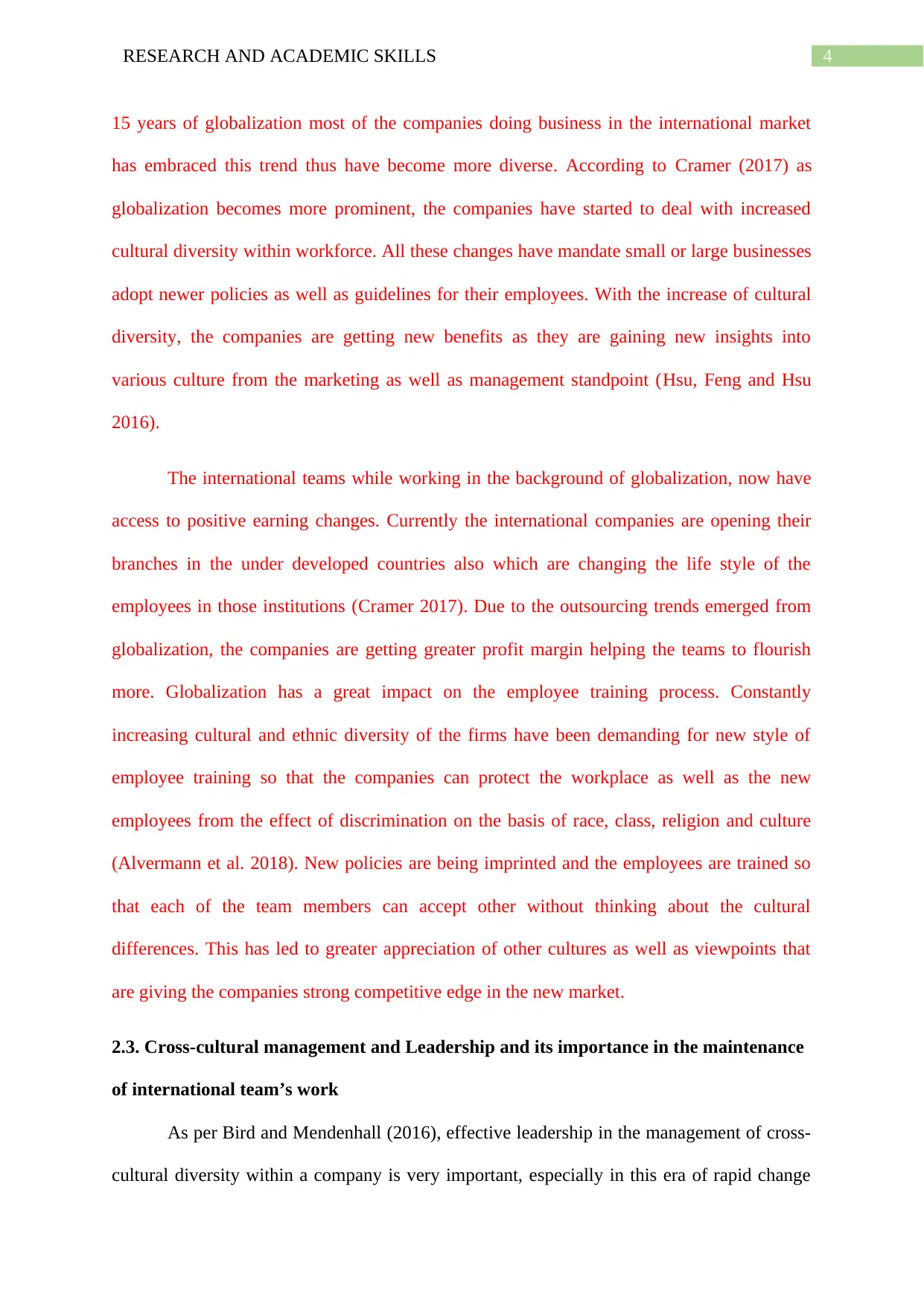
4RESEARCH AND ACADEMIC SKILLS
15 years of globalization most of the companies doing business in the international market
has embraced this trend thus have become more diverse. According to Cramer (2017) as
globalization becomes more prominent, the companies have started to deal with increased
cultural diversity within workforce. All these changes have mandate small or large businesses
adopt newer policies as well as guidelines for their employees. With the increase of cultural
diversity, the companies are getting new benefits as they are gaining new insights into
various culture from the marketing as well as management standpoint (Hsu, Feng and Hsu
2016).
The international teams while working in the background of globalization, now have
access to positive earning changes. Currently the international companies are opening their
branches in the under developed countries also which are changing the life style of the
employees in those institutions (Cramer 2017). Due to the outsourcing trends emerged from
globalization, the companies are getting greater profit margin helping the teams to flourish
more. Globalization has a great impact on the employee training process. Constantly
increasing cultural and ethnic diversity of the firms have been demanding for new style of
employee training so that the companies can protect the workplace as well as the new
employees from the effect of discrimination on the basis of race, class, religion and culture
(Alvermann et al. 2018). New policies are being imprinted and the employees are trained so
that each of the team members can accept other without thinking about the cultural
differences. This has led to greater appreciation of other cultures as well as viewpoints that
are giving the companies strong competitive edge in the new market.
2.3. Cross-cultural management and Leadership and its importance in the maintenance
of international team’s work
As per Bird and Mendenhall (2016), effective leadership in the management of cross-
cultural diversity within a company is very important, especially in this era of rapid change
15 years of globalization most of the companies doing business in the international market
has embraced this trend thus have become more diverse. According to Cramer (2017) as
globalization becomes more prominent, the companies have started to deal with increased
cultural diversity within workforce. All these changes have mandate small or large businesses
adopt newer policies as well as guidelines for their employees. With the increase of cultural
diversity, the companies are getting new benefits as they are gaining new insights into
various culture from the marketing as well as management standpoint (Hsu, Feng and Hsu
2016).
The international teams while working in the background of globalization, now have
access to positive earning changes. Currently the international companies are opening their
branches in the under developed countries also which are changing the life style of the
employees in those institutions (Cramer 2017). Due to the outsourcing trends emerged from
globalization, the companies are getting greater profit margin helping the teams to flourish
more. Globalization has a great impact on the employee training process. Constantly
increasing cultural and ethnic diversity of the firms have been demanding for new style of
employee training so that the companies can protect the workplace as well as the new
employees from the effect of discrimination on the basis of race, class, religion and culture
(Alvermann et al. 2018). New policies are being imprinted and the employees are trained so
that each of the team members can accept other without thinking about the cultural
differences. This has led to greater appreciation of other cultures as well as viewpoints that
are giving the companies strong competitive edge in the new market.
2.3. Cross-cultural management and Leadership and its importance in the maintenance
of international team’s work
As per Bird and Mendenhall (2016), effective leadership in the management of cross-
cultural diversity within a company is very important, especially in this era of rapid change
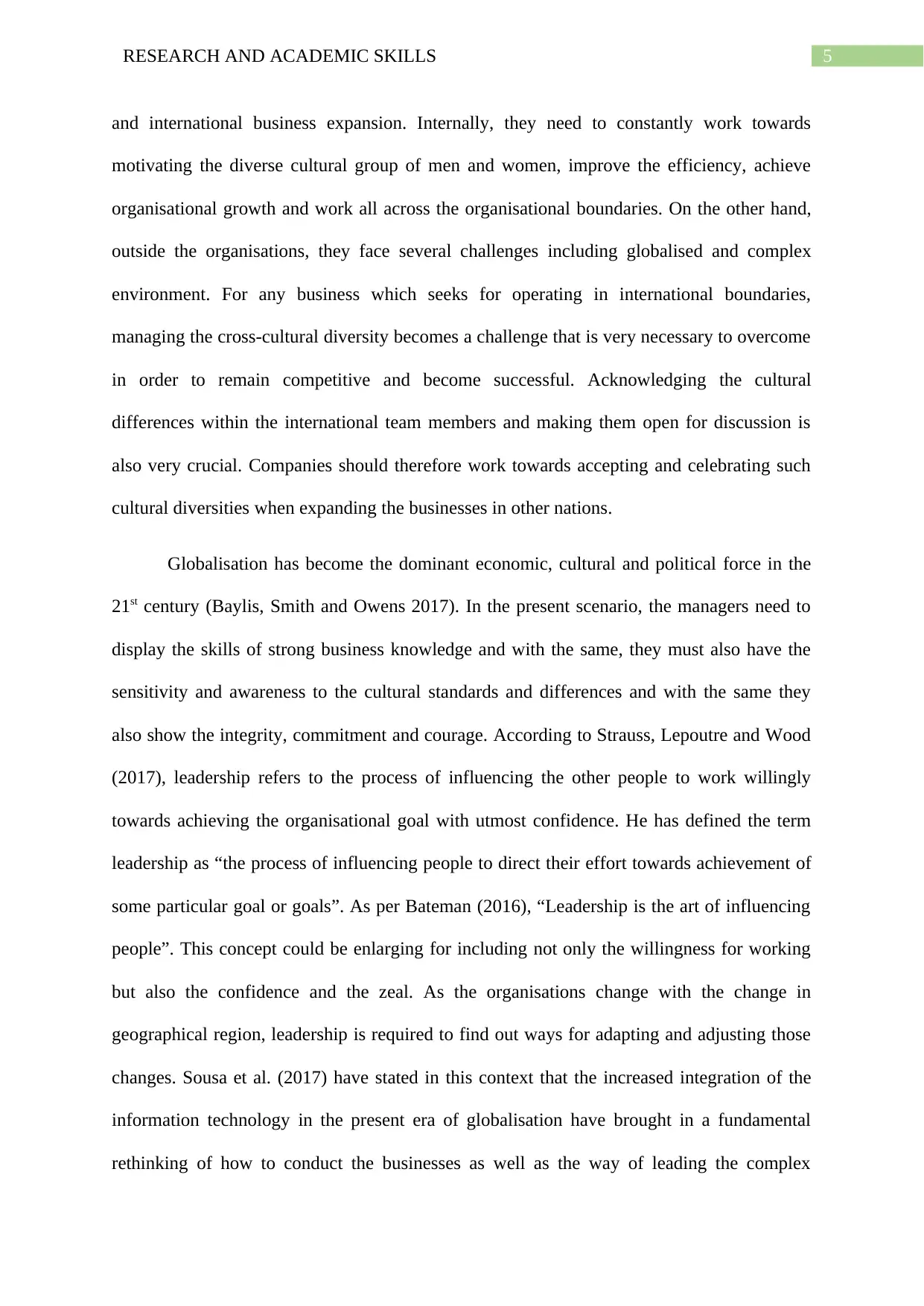
5RESEARCH AND ACADEMIC SKILLS
and international business expansion. Internally, they need to constantly work towards
motivating the diverse cultural group of men and women, improve the efficiency, achieve
organisational growth and work all across the organisational boundaries. On the other hand,
outside the organisations, they face several challenges including globalised and complex
environment. For any business which seeks for operating in international boundaries,
managing the cross-cultural diversity becomes a challenge that is very necessary to overcome
in order to remain competitive and become successful. Acknowledging the cultural
differences within the international team members and making them open for discussion is
also very crucial. Companies should therefore work towards accepting and celebrating such
cultural diversities when expanding the businesses in other nations.
Globalisation has become the dominant economic, cultural and political force in the
21st century (Baylis, Smith and Owens 2017). In the present scenario, the managers need to
display the skills of strong business knowledge and with the same, they must also have the
sensitivity and awareness to the cultural standards and differences and with the same they
also show the integrity, commitment and courage. According to Strauss, Lepoutre and Wood
(2017), leadership refers to the process of influencing the other people to work willingly
towards achieving the organisational goal with utmost confidence. He has defined the term
leadership as “the process of influencing people to direct their effort towards achievement of
some particular goal or goals”. As per Bateman (2016), “Leadership is the art of influencing
people”. This concept could be enlarging for including not only the willingness for working
but also the confidence and the zeal. As the organisations change with the change in
geographical region, leadership is required to find out ways for adapting and adjusting those
changes. Sousa et al. (2017) have stated in this context that the increased integration of the
information technology in the present era of globalisation have brought in a fundamental
rethinking of how to conduct the businesses as well as the way of leading the complex
and international business expansion. Internally, they need to constantly work towards
motivating the diverse cultural group of men and women, improve the efficiency, achieve
organisational growth and work all across the organisational boundaries. On the other hand,
outside the organisations, they face several challenges including globalised and complex
environment. For any business which seeks for operating in international boundaries,
managing the cross-cultural diversity becomes a challenge that is very necessary to overcome
in order to remain competitive and become successful. Acknowledging the cultural
differences within the international team members and making them open for discussion is
also very crucial. Companies should therefore work towards accepting and celebrating such
cultural diversities when expanding the businesses in other nations.
Globalisation has become the dominant economic, cultural and political force in the
21st century (Baylis, Smith and Owens 2017). In the present scenario, the managers need to
display the skills of strong business knowledge and with the same, they must also have the
sensitivity and awareness to the cultural standards and differences and with the same they
also show the integrity, commitment and courage. According to Strauss, Lepoutre and Wood
(2017), leadership refers to the process of influencing the other people to work willingly
towards achieving the organisational goal with utmost confidence. He has defined the term
leadership as “the process of influencing people to direct their effort towards achievement of
some particular goal or goals”. As per Bateman (2016), “Leadership is the art of influencing
people”. This concept could be enlarging for including not only the willingness for working
but also the confidence and the zeal. As the organisations change with the change in
geographical region, leadership is required to find out ways for adapting and adjusting those
changes. Sousa et al. (2017) have stated in this context that the increased integration of the
information technology in the present era of globalisation have brought in a fundamental
rethinking of how to conduct the businesses as well as the way of leading the complex
⊘ This is a preview!⊘
Do you want full access?
Subscribe today to unlock all pages.

Trusted by 1+ million students worldwide
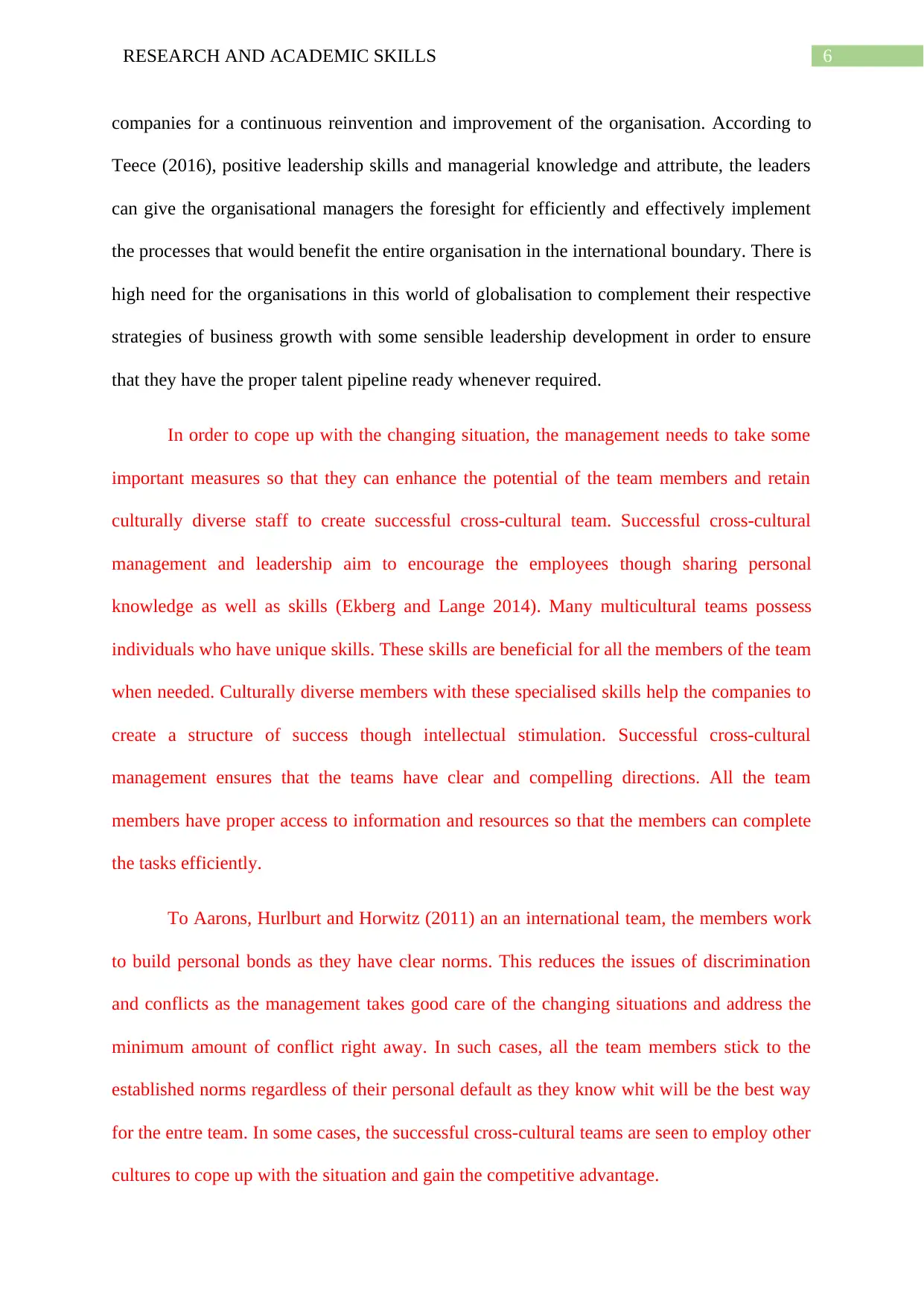
6RESEARCH AND ACADEMIC SKILLS
companies for a continuous reinvention and improvement of the organisation. According to
Teece (2016), positive leadership skills and managerial knowledge and attribute, the leaders
can give the organisational managers the foresight for efficiently and effectively implement
the processes that would benefit the entire organisation in the international boundary. There is
high need for the organisations in this world of globalisation to complement their respective
strategies of business growth with some sensible leadership development in order to ensure
that they have the proper talent pipeline ready whenever required.
In order to cope up with the changing situation, the management needs to take some
important measures so that they can enhance the potential of the team members and retain
culturally diverse staff to create successful cross-cultural team. Successful cross-cultural
management and leadership aim to encourage the employees though sharing personal
knowledge as well as skills (Ekberg and Lange 2014). Many multicultural teams possess
individuals who have unique skills. These skills are beneficial for all the members of the team
when needed. Culturally diverse members with these specialised skills help the companies to
create a structure of success though intellectual stimulation. Successful cross-cultural
management ensures that the teams have clear and compelling directions. All the team
members have proper access to information and resources so that the members can complete
the tasks efficiently.
To Aarons, Hurlburt and Horwitz (2011) an an international team, the members work
to build personal bonds as they have clear norms. This reduces the issues of discrimination
and conflicts as the management takes good care of the changing situations and address the
minimum amount of conflict right away. In such cases, all the team members stick to the
established norms regardless of their personal default as they know whit will be the best way
for the entre team. In some cases, the successful cross-cultural teams are seen to employ other
cultures to cope up with the situation and gain the competitive advantage.
companies for a continuous reinvention and improvement of the organisation. According to
Teece (2016), positive leadership skills and managerial knowledge and attribute, the leaders
can give the organisational managers the foresight for efficiently and effectively implement
the processes that would benefit the entire organisation in the international boundary. There is
high need for the organisations in this world of globalisation to complement their respective
strategies of business growth with some sensible leadership development in order to ensure
that they have the proper talent pipeline ready whenever required.
In order to cope up with the changing situation, the management needs to take some
important measures so that they can enhance the potential of the team members and retain
culturally diverse staff to create successful cross-cultural team. Successful cross-cultural
management and leadership aim to encourage the employees though sharing personal
knowledge as well as skills (Ekberg and Lange 2014). Many multicultural teams possess
individuals who have unique skills. These skills are beneficial for all the members of the team
when needed. Culturally diverse members with these specialised skills help the companies to
create a structure of success though intellectual stimulation. Successful cross-cultural
management ensures that the teams have clear and compelling directions. All the team
members have proper access to information and resources so that the members can complete
the tasks efficiently.
To Aarons, Hurlburt and Horwitz (2011) an an international team, the members work
to build personal bonds as they have clear norms. This reduces the issues of discrimination
and conflicts as the management takes good care of the changing situations and address the
minimum amount of conflict right away. In such cases, all the team members stick to the
established norms regardless of their personal default as they know whit will be the best way
for the entre team. In some cases, the successful cross-cultural teams are seen to employ other
cultures to cope up with the situation and gain the competitive advantage.
Paraphrase This Document
Need a fresh take? Get an instant paraphrase of this document with our AI Paraphraser
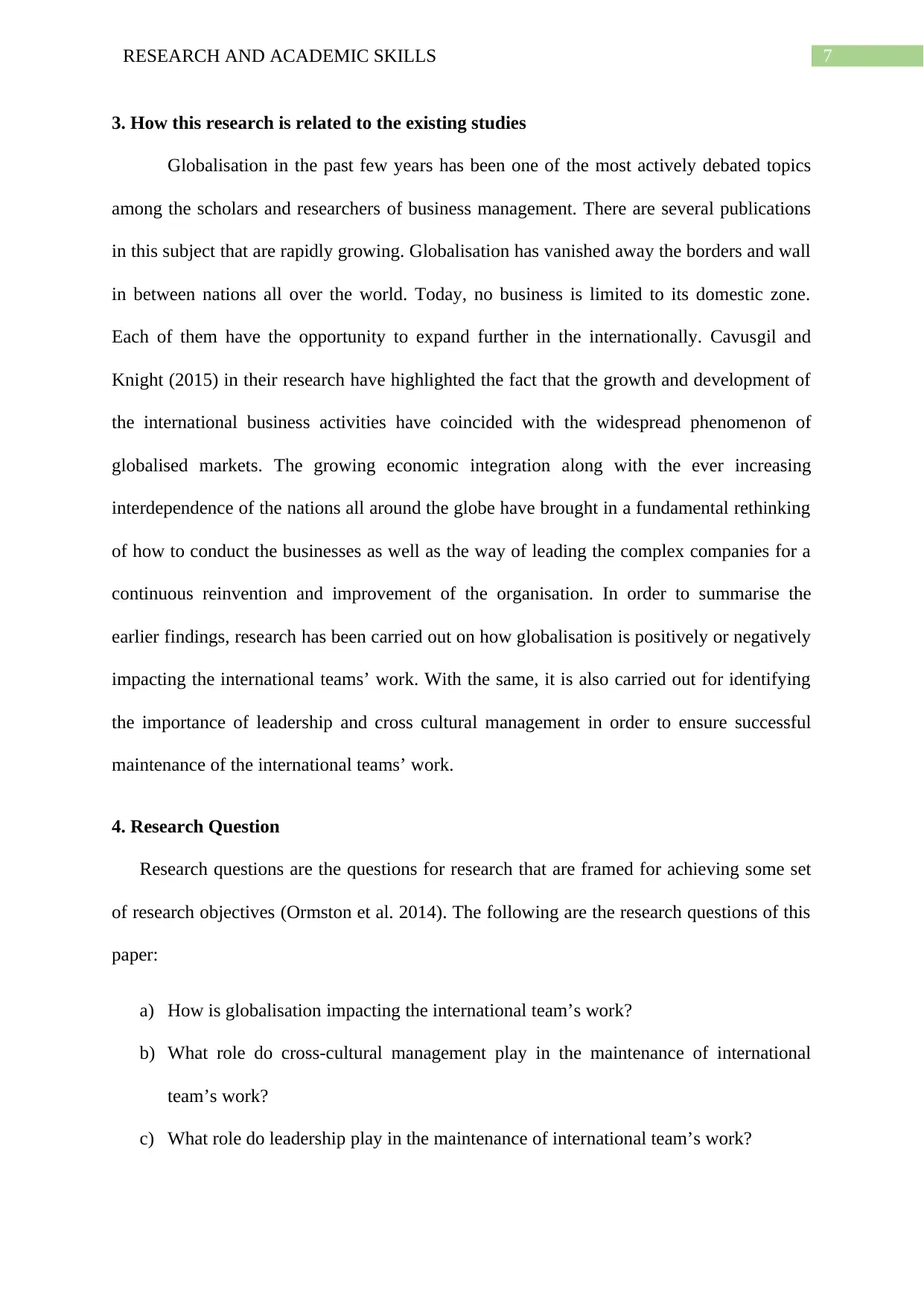
7RESEARCH AND ACADEMIC SKILLS
3. How this research is related to the existing studies
Globalisation in the past few years has been one of the most actively debated topics
among the scholars and researchers of business management. There are several publications
in this subject that are rapidly growing. Globalisation has vanished away the borders and wall
in between nations all over the world. Today, no business is limited to its domestic zone.
Each of them have the opportunity to expand further in the internationally. Cavusgil and
Knight (2015) in their research have highlighted the fact that the growth and development of
the international business activities have coincided with the widespread phenomenon of
globalised markets. The growing economic integration along with the ever increasing
interdependence of the nations all around the globe have brought in a fundamental rethinking
of how to conduct the businesses as well as the way of leading the complex companies for a
continuous reinvention and improvement of the organisation. In order to summarise the
earlier findings, research has been carried out on how globalisation is positively or negatively
impacting the international teams’ work. With the same, it is also carried out for identifying
the importance of leadership and cross cultural management in order to ensure successful
maintenance of the international teams’ work.
4. Research Question
Research questions are the questions for research that are framed for achieving some set
of research objectives (Ormston et al. 2014). The following are the research questions of this
paper:
a) How is globalisation impacting the international team’s work?
b) What role do cross-cultural management play in the maintenance of international
team’s work?
c) What role do leadership play in the maintenance of international team’s work?
3. How this research is related to the existing studies
Globalisation in the past few years has been one of the most actively debated topics
among the scholars and researchers of business management. There are several publications
in this subject that are rapidly growing. Globalisation has vanished away the borders and wall
in between nations all over the world. Today, no business is limited to its domestic zone.
Each of them have the opportunity to expand further in the internationally. Cavusgil and
Knight (2015) in their research have highlighted the fact that the growth and development of
the international business activities have coincided with the widespread phenomenon of
globalised markets. The growing economic integration along with the ever increasing
interdependence of the nations all around the globe have brought in a fundamental rethinking
of how to conduct the businesses as well as the way of leading the complex companies for a
continuous reinvention and improvement of the organisation. In order to summarise the
earlier findings, research has been carried out on how globalisation is positively or negatively
impacting the international teams’ work. With the same, it is also carried out for identifying
the importance of leadership and cross cultural management in order to ensure successful
maintenance of the international teams’ work.
4. Research Question
Research questions are the questions for research that are framed for achieving some set
of research objectives (Ormston et al. 2014). The following are the research questions of this
paper:
a) How is globalisation impacting the international team’s work?
b) What role do cross-cultural management play in the maintenance of international
team’s work?
c) What role do leadership play in the maintenance of international team’s work?
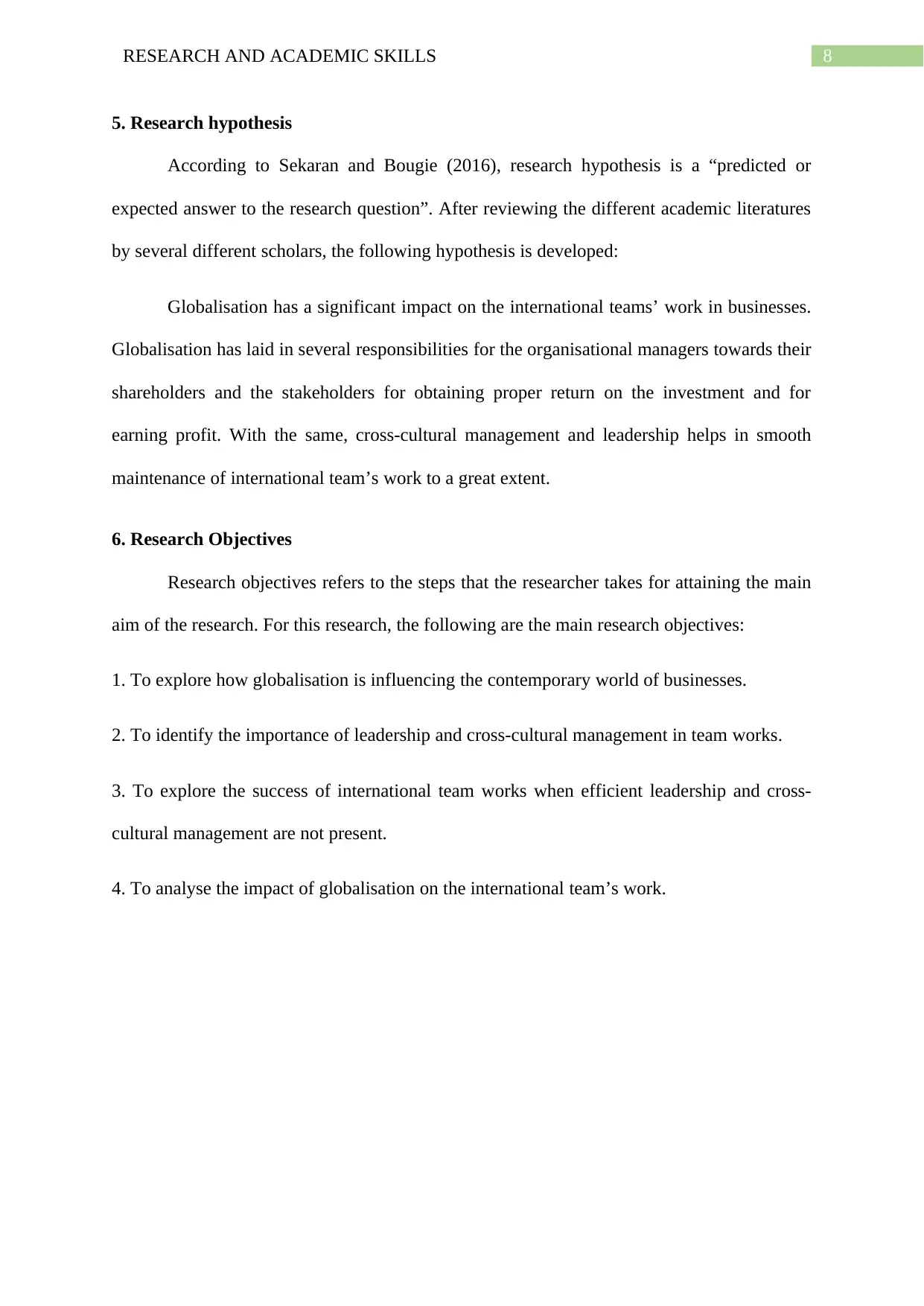
8RESEARCH AND ACADEMIC SKILLS
5. Research hypothesis
According to Sekaran and Bougie (2016), research hypothesis is a “predicted or
expected answer to the research question”. After reviewing the different academic literatures
by several different scholars, the following hypothesis is developed:
Globalisation has a significant impact on the international teams’ work in businesses.
Globalisation has laid in several responsibilities for the organisational managers towards their
shareholders and the stakeholders for obtaining proper return on the investment and for
earning profit. With the same, cross-cultural management and leadership helps in smooth
maintenance of international team’s work to a great extent.
6. Research Objectives
Research objectives refers to the steps that the researcher takes for attaining the main
aim of the research. For this research, the following are the main research objectives:
1. To explore how globalisation is influencing the contemporary world of businesses.
2. To identify the importance of leadership and cross-cultural management in team works.
3. To explore the success of international team works when efficient leadership and cross-
cultural management are not present.
4. To analyse the impact of globalisation on the international team’s work.
5. Research hypothesis
According to Sekaran and Bougie (2016), research hypothesis is a “predicted or
expected answer to the research question”. After reviewing the different academic literatures
by several different scholars, the following hypothesis is developed:
Globalisation has a significant impact on the international teams’ work in businesses.
Globalisation has laid in several responsibilities for the organisational managers towards their
shareholders and the stakeholders for obtaining proper return on the investment and for
earning profit. With the same, cross-cultural management and leadership helps in smooth
maintenance of international team’s work to a great extent.
6. Research Objectives
Research objectives refers to the steps that the researcher takes for attaining the main
aim of the research. For this research, the following are the main research objectives:
1. To explore how globalisation is influencing the contemporary world of businesses.
2. To identify the importance of leadership and cross-cultural management in team works.
3. To explore the success of international team works when efficient leadership and cross-
cultural management are not present.
4. To analyse the impact of globalisation on the international team’s work.
⊘ This is a preview!⊘
Do you want full access?
Subscribe today to unlock all pages.

Trusted by 1+ million students worldwide
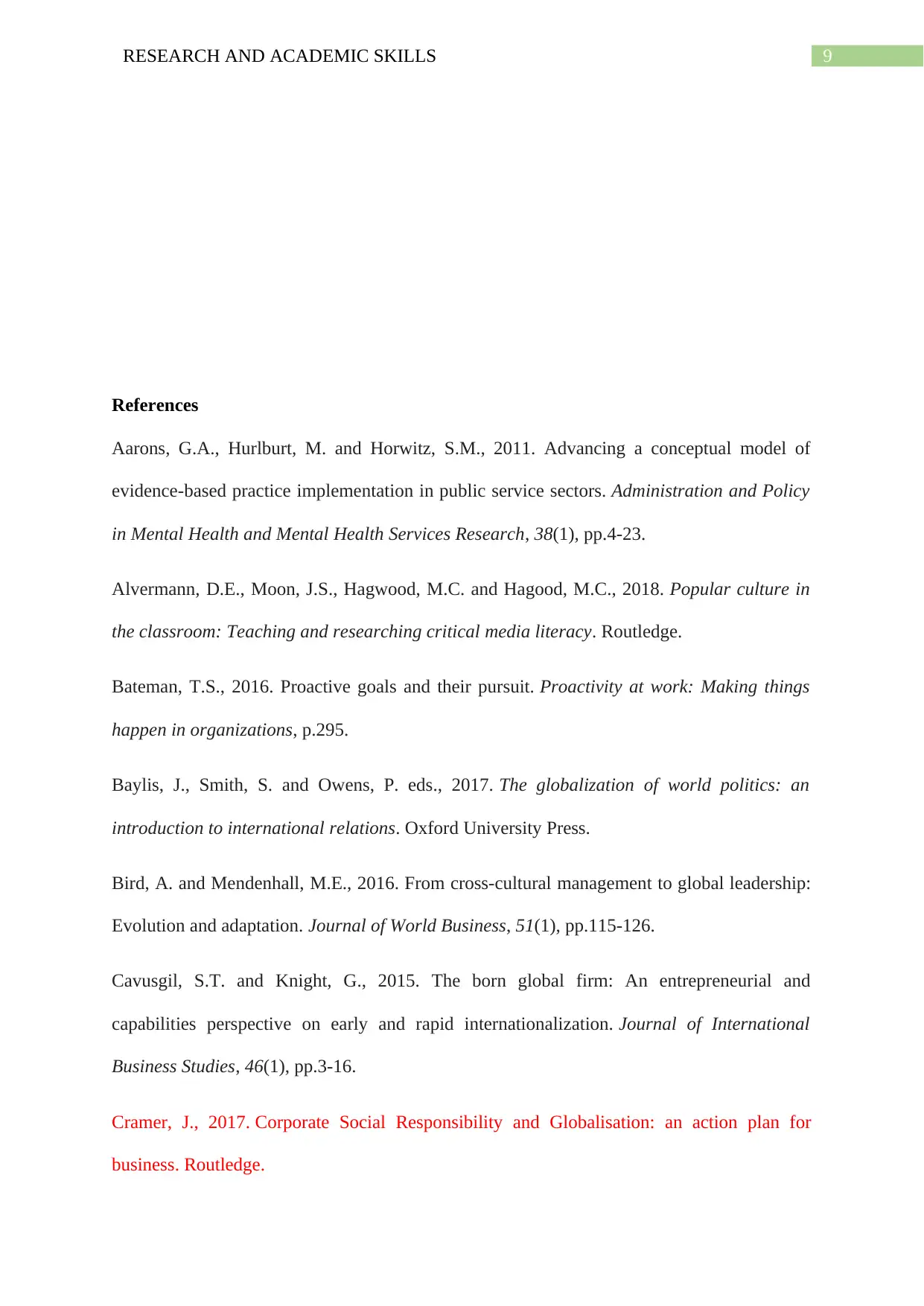
9RESEARCH AND ACADEMIC SKILLS
References
Aarons, G.A., Hurlburt, M. and Horwitz, S.M., 2011. Advancing a conceptual model of
evidence-based practice implementation in public service sectors. Administration and Policy
in Mental Health and Mental Health Services Research, 38(1), pp.4-23.
Alvermann, D.E., Moon, J.S., Hagwood, M.C. and Hagood, M.C., 2018. Popular culture in
the classroom: Teaching and researching critical media literacy. Routledge.
Bateman, T.S., 2016. Proactive goals and their pursuit. Proactivity at work: Making things
happen in organizations, p.295.
Baylis, J., Smith, S. and Owens, P. eds., 2017. The globalization of world politics: an
introduction to international relations. Oxford University Press.
Bird, A. and Mendenhall, M.E., 2016. From cross-cultural management to global leadership:
Evolution and adaptation. Journal of World Business, 51(1), pp.115-126.
Cavusgil, S.T. and Knight, G., 2015. The born global firm: An entrepreneurial and
capabilities perspective on early and rapid internationalization. Journal of International
Business Studies, 46(1), pp.3-16.
Cramer, J., 2017. Corporate Social Responsibility and Globalisation: an action plan for
business. Routledge.
References
Aarons, G.A., Hurlburt, M. and Horwitz, S.M., 2011. Advancing a conceptual model of
evidence-based practice implementation in public service sectors. Administration and Policy
in Mental Health and Mental Health Services Research, 38(1), pp.4-23.
Alvermann, D.E., Moon, J.S., Hagwood, M.C. and Hagood, M.C., 2018. Popular culture in
the classroom: Teaching and researching critical media literacy. Routledge.
Bateman, T.S., 2016. Proactive goals and their pursuit. Proactivity at work: Making things
happen in organizations, p.295.
Baylis, J., Smith, S. and Owens, P. eds., 2017. The globalization of world politics: an
introduction to international relations. Oxford University Press.
Bird, A. and Mendenhall, M.E., 2016. From cross-cultural management to global leadership:
Evolution and adaptation. Journal of World Business, 51(1), pp.115-126.
Cavusgil, S.T. and Knight, G., 2015. The born global firm: An entrepreneurial and
capabilities perspective on early and rapid internationalization. Journal of International
Business Studies, 46(1), pp.3-16.
Cramer, J., 2017. Corporate Social Responsibility and Globalisation: an action plan for
business. Routledge.
Paraphrase This Document
Need a fresh take? Get an instant paraphrase of this document with our AI Paraphraser
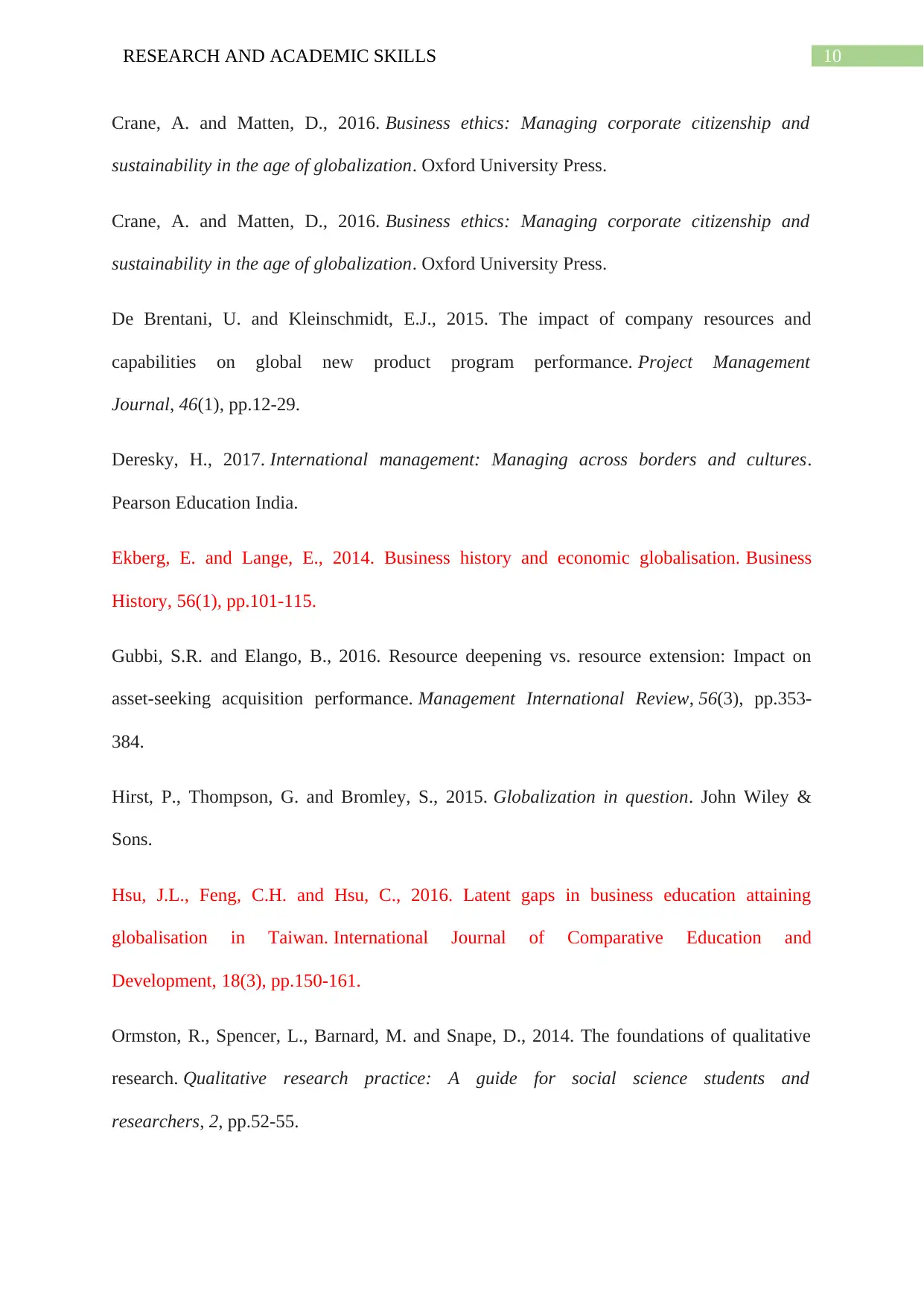
10RESEARCH AND ACADEMIC SKILLS
Crane, A. and Matten, D., 2016. Business ethics: Managing corporate citizenship and
sustainability in the age of globalization. Oxford University Press.
Crane, A. and Matten, D., 2016. Business ethics: Managing corporate citizenship and
sustainability in the age of globalization. Oxford University Press.
De Brentani, U. and Kleinschmidt, E.J., 2015. The impact of company resources and
capabilities on global new product program performance. Project Management
Journal, 46(1), pp.12-29.
Deresky, H., 2017. International management: Managing across borders and cultures.
Pearson Education India.
Ekberg, E. and Lange, E., 2014. Business history and economic globalisation. Business
History, 56(1), pp.101-115.
Gubbi, S.R. and Elango, B., 2016. Resource deepening vs. resource extension: Impact on
asset-seeking acquisition performance. Management International Review, 56(3), pp.353-
384.
Hirst, P., Thompson, G. and Bromley, S., 2015. Globalization in question. John Wiley &
Sons.
Hsu, J.L., Feng, C.H. and Hsu, C., 2016. Latent gaps in business education attaining
globalisation in Taiwan. International Journal of Comparative Education and
Development, 18(3), pp.150-161.
Ormston, R., Spencer, L., Barnard, M. and Snape, D., 2014. The foundations of qualitative
research. Qualitative research practice: A guide for social science students and
researchers, 2, pp.52-55.
Crane, A. and Matten, D., 2016. Business ethics: Managing corporate citizenship and
sustainability in the age of globalization. Oxford University Press.
Crane, A. and Matten, D., 2016. Business ethics: Managing corporate citizenship and
sustainability in the age of globalization. Oxford University Press.
De Brentani, U. and Kleinschmidt, E.J., 2015. The impact of company resources and
capabilities on global new product program performance. Project Management
Journal, 46(1), pp.12-29.
Deresky, H., 2017. International management: Managing across borders and cultures.
Pearson Education India.
Ekberg, E. and Lange, E., 2014. Business history and economic globalisation. Business
History, 56(1), pp.101-115.
Gubbi, S.R. and Elango, B., 2016. Resource deepening vs. resource extension: Impact on
asset-seeking acquisition performance. Management International Review, 56(3), pp.353-
384.
Hirst, P., Thompson, G. and Bromley, S., 2015. Globalization in question. John Wiley &
Sons.
Hsu, J.L., Feng, C.H. and Hsu, C., 2016. Latent gaps in business education attaining
globalisation in Taiwan. International Journal of Comparative Education and
Development, 18(3), pp.150-161.
Ormston, R., Spencer, L., Barnard, M. and Snape, D., 2014. The foundations of qualitative
research. Qualitative research practice: A guide for social science students and
researchers, 2, pp.52-55.
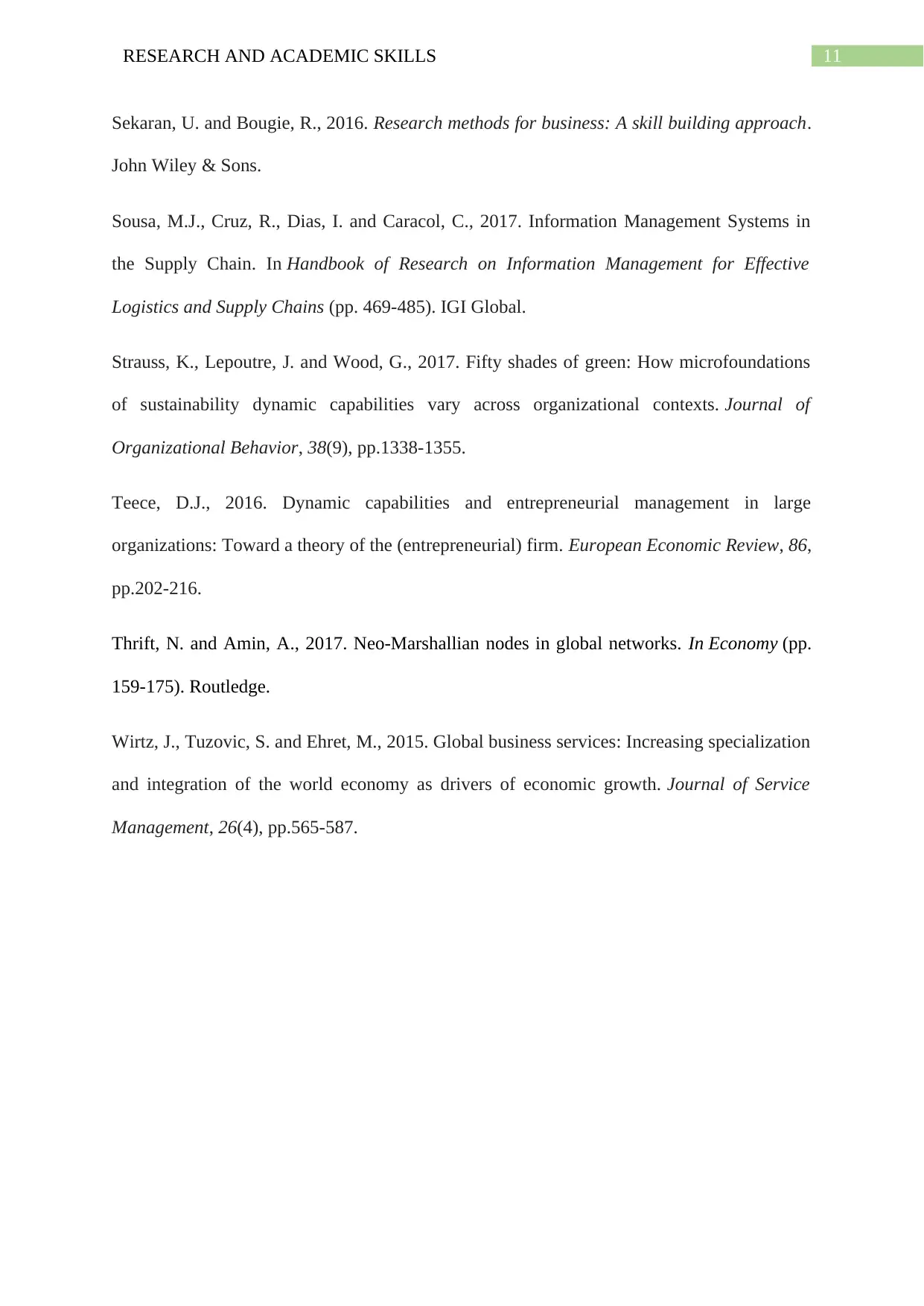
11RESEARCH AND ACADEMIC SKILLS
Sekaran, U. and Bougie, R., 2016. Research methods for business: A skill building approach.
John Wiley & Sons.
Sousa, M.J., Cruz, R., Dias, I. and Caracol, C., 2017. Information Management Systems in
the Supply Chain. In Handbook of Research on Information Management for Effective
Logistics and Supply Chains (pp. 469-485). IGI Global.
Strauss, K., Lepoutre, J. and Wood, G., 2017. Fifty shades of green: How microfoundations
of sustainability dynamic capabilities vary across organizational contexts. Journal of
Organizational Behavior, 38(9), pp.1338-1355.
Teece, D.J., 2016. Dynamic capabilities and entrepreneurial management in large
organizations: Toward a theory of the (entrepreneurial) firm. European Economic Review, 86,
pp.202-216.
Thrift, N. and Amin, A., 2017. Neo-Marshallian nodes in global networks. In Economy (pp.
159-175). Routledge.
Wirtz, J., Tuzovic, S. and Ehret, M., 2015. Global business services: Increasing specialization
and integration of the world economy as drivers of economic growth. Journal of Service
Management, 26(4), pp.565-587.
Sekaran, U. and Bougie, R., 2016. Research methods for business: A skill building approach.
John Wiley & Sons.
Sousa, M.J., Cruz, R., Dias, I. and Caracol, C., 2017. Information Management Systems in
the Supply Chain. In Handbook of Research on Information Management for Effective
Logistics and Supply Chains (pp. 469-485). IGI Global.
Strauss, K., Lepoutre, J. and Wood, G., 2017. Fifty shades of green: How microfoundations
of sustainability dynamic capabilities vary across organizational contexts. Journal of
Organizational Behavior, 38(9), pp.1338-1355.
Teece, D.J., 2016. Dynamic capabilities and entrepreneurial management in large
organizations: Toward a theory of the (entrepreneurial) firm. European Economic Review, 86,
pp.202-216.
Thrift, N. and Amin, A., 2017. Neo-Marshallian nodes in global networks. In Economy (pp.
159-175). Routledge.
Wirtz, J., Tuzovic, S. and Ehret, M., 2015. Global business services: Increasing specialization
and integration of the world economy as drivers of economic growth. Journal of Service
Management, 26(4), pp.565-587.
⊘ This is a preview!⊘
Do you want full access?
Subscribe today to unlock all pages.

Trusted by 1+ million students worldwide
1 out of 12
Related Documents
Your All-in-One AI-Powered Toolkit for Academic Success.
+13062052269
info@desklib.com
Available 24*7 on WhatsApp / Email
![[object Object]](/_next/static/media/star-bottom.7253800d.svg)
Unlock your academic potential
Copyright © 2020–2026 A2Z Services. All Rights Reserved. Developed and managed by ZUCOL.





